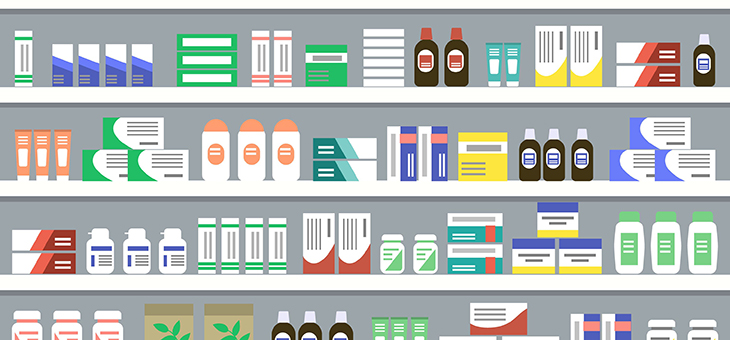Out-of-date medicines and pills can probably be found lingering at the back of cabinets and drawers in many households. But can medication that’s passed its expiry date be harmful? And will expired medicine still work?
Whenever you get a prescription or buy over-the-counter medicines or ointments from a reputable shop or pharmacy, there should always be an expiry/use-by date on the packaging.
Phil Day, the superintendent pharmacist at Pharmacy2U, explains why paying attention to medication expiry dates is important.

“I’m sure we all have a few packs of medicines stored in the house somewhere, maybe in the bathroom cabinet or the cupboard under the sink. But when was the last time you checked them? What we perhaps don’t realise is that storing them incorrectly, or keeping them past their expiry date, could cause problems when we need to use them.
“Temperature can be important. Some medicines have very specific storage requirements. For example, some eye drops, creams, and antibiotic liquids need to be kept in the fridge while they’re in use, to keep them fresh. Insulin should be stored in a fridge, but some types can be kept at room temperature when they’re in use. Most other medicines are fine when stored at room temperature (up to 25C) but shouldn’t be stored in direct sunlight or in very warm or cold environments (so don’t store your medicines in the shed!). The patient information leaflet for each medicine will tell you how it should be stored.
“If medicines are kept in the wrong environment, it could make them degrade more quickly, and therefore make them less effective. It’s also possible that you would be more likely to experience side-effects if the medicine is no longer stable.
“Expiry dates are another thing to watch out for. There are several ways they can be written on medicine packaging. ‘Expiry date’ means that you should not use the medicine after the stated date, or after the last day of the month specified. If there is a ‘use-by’ date, this means you should not use the medicine after the end of the previous month. So, an expiry date of August 2020 means you should not use the medicine after 31 August 2020, but a use-by date of August 2020 means you should not use it after 31 July 2020.
“Obviously, a medicine with an expiry date of July 2020 doesn’t suddenly change overnight and become totally ineffective or dangerous on 1 August. But I wouldn’t recommend using medicine outside of its intended date range without medical advice. The manufacturer has conducted many stability tests and determined the best time frame for its safe use.

“For medicines that were dispensed for you by a pharmacy, you should also look at the dispensing label (containing your name, and the name of the pharmacy) for any further storage or expiry date instructions. For example, some medicines may have a long expiry date on the product packaging, but on the dispensing label, it could say ‘discard 28 days after opening’ (common for eye drops), or ‘get a new supply eight weeks after opening’ (this applies to GTN tablets, for the relief of angina). Antibiotic liquids and some specially made medicines usually have a short expiry date, maybe just one or two weeks, depending on the product.
“It’s always helpful to keep some essential medicines in the home – but you should check your stocks occasionally to see if any of them have expired, or been stored outside of their recommended environment. Seasonal medicines, like antihistamines or cold remedies, might be sitting in your cabinet for a long time before they’re next needed – and when that next virus comes around, you’ll thank yourself for replacing that out-of-date cough linctus in advance.
“I would also recommend keeping your medicines in their original packaging to keep them protected from sunlight, along with the original leaflet. Also, always remember to store medicines in a safe place, out of the reach of children and pets, and ask your pharmacist if you have any questions about how to use or store them. They will also be able to safely destroy any out-of-date medicines you have.”
How much medication do you typically keep at home? Do you check expiry dates on medications before taking them?
– With PA
If you enjoy our content, don’t keep it to yourself. Share our free eNews with your friends and encourage them to sign up.
Related articles:
https://www.yourlifechoices.com.au/news/new-principles-for-medication-management
https://www.yourlifechoices.com.au/health/wellbeing/medication/is-that-medication-right-for-you
https://www.yourlifechoices.com.au/health/things-in-your-home-that-can-make-you-sick

